Linking eveningness to depression and anxiety: the mediating role of impulsivity and resilience
DOI:
https://doi.org/10.32552/2025.ActaMedica.1146Keywords:
anxiety, chronotype, depression, impulsivity, resilienceAbstract
Objective: This study investigated the interrelationships between chronotype, impulsivity, resilience, and affective symptomatology in individuals with Major Depressive Disorder (MDD) in remission. Specifically, it examined whether impulsivity and resilience mediate the association between eveningness and depressive and anxiety symptoms, and whether sleep quality moderates these pathways.
Materials and Methods: This cross-sectional study was conducted between February and April 2025 at Istanbul Tuzla State Hospital, Türkiye, and included 203 patients diagnosed with MDD in remission. Participants were assessed using validated psychometric instruments, including the Morningness-Eveningness Questionnaire (MEQ), Beck Depression Inventory (BDI), Beck Anxiety Inventory (BAI), Psychological Resilience Scale (PRS-33), Barratt Impulsiveness Scale (BIS-11), and the Pittsburgh Sleep Quality Index (PSQI). Analyses were conducted using SPSS 22.0, including correlations, multiple linear regression, and PROCESS-based mediation and moderation models.
Results: Eveningness was significantly associated with increased severity of both depressive and anxiety symptoms. Non-planning and attentional impulsivity partially mediated the relationship between eveningness and depressive symptoms. Resilience also partially mediated the link between eveningness and depression, indicating a protective psychological buffer. Sleep quality moderated the chronotype–depression association, such that poor sleep exacerbated depressive symptoms in evening types, but it did not moderate the chronotype–anxiety link.
Conclusion: Chronotype influences mental health outcomes through intricate cognitive-affective pathways. Evening-type individuals are more vulnerable to affective symptoms due to heightened impulsivity and reduced resilience. These findings emphasize the need for multidimensional interventions that address not only circadian misalignment but also impulsivity regulation and resilience enhancement to improve psychological outcomes in mood disorder populations.
Downloads
Downloads
Published
How to Cite
Issue
Section
License
Copyright (c) 2025 Acta Medica

This work is licensed under a Creative Commons Attribution-NonCommercial-NoDerivatives 4.0 International License.


